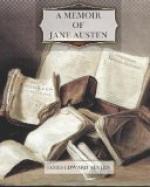CHAPTER X.
Observations on the Novels.
It is not the object of these memoirs to attempt a criticism on Jane Austen’s novels. Those particulars only have been noticed which could be illustrated by the circumstances of her own life; but I now desire to offer a few observations on them, and especially on one point, on which my age renders me a competent witness—the fidelity with which they represent the opinions and manners of the class of society in which the author lived early in this century. They do this the more faithfully on account of the very deficiency with which they have been sometimes charged—namely, that they make no attempt to raise the standard of human life, but merely represent it as it was. They certainly were not written to support any theory or inculcate any particular moral, except indeed the great moral which is to be equally gathered from an observation of the course of actual life—namely, the superiority of high over low principles, and of greatness over littleness of mind. These writings are like photographs, in which no feature is softened; no ideal expression is introduced, all is the unadorned reflection of the natural object; and the value of such a faithful likeness must increase as time gradually works more and more changes in the face of society itself. A remarkable instance of this is to be found in her portraiture of the clergy. She was the daughter and the sister of clergymen, who certainly were not low specimens of their order: and she has chosen three of her heroes from that profession; but no one in these days can think that either Edmund Bertram or Henry Tilney had adequate ideas of the duties of a parish minister. Such, however, were the opinions and practice then prevalent among respectable and conscientious clergymen before their minds had been stirred, first by the Evangelical, and afterwards by the High Church movement which this century has witnessed. The country may be congratulated which, on looking back to such a fixed landmark, can find that it has been advancing instead of receding from it.
The long interval that elapsed between the completion of ’Northanger Abbey’ in 1798, and the commencement of ‘Mansfield Park’ in 1811, may sufficiently account for any difference of style which may be perceived between her three earlier and her three later productions. If the former showed quite as much originality and genius, they may perhaps be thought to have less of the faultless finish and high polish which distinguish the latter. The characters of the John Dashwoods, Mr. Collins, and the Thorpes stand out from the canvas with a vigour and originality which cannot be surpassed; but I think that in her last three works are to be found a greater refinement of taste, a more nice sense of propriety, and a deeper insight into the delicate anatomy of the human heart, marking the difference between the brilliant girl and the mature woman. Far from being one of those who have over-written themselves, it may be affirmed that her fame would have stood on a narrower and less firm basis, if she had not lived to resume her pen at Chawton.




